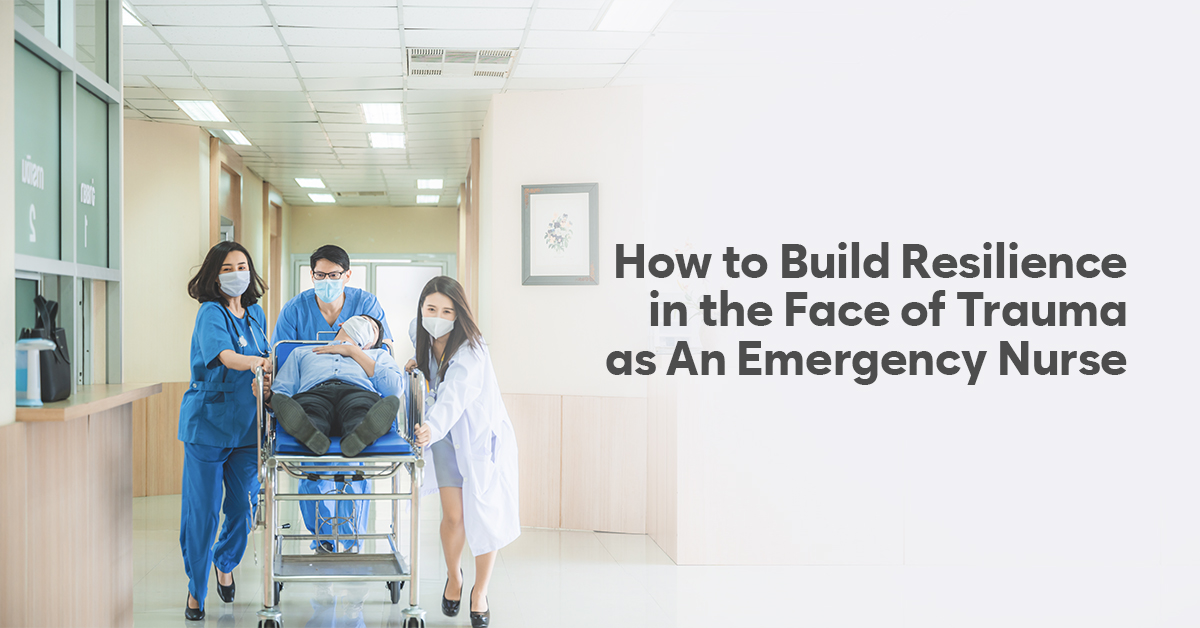Working as an emergency nurse can be one of the most challenging and rewarding careers in healthcare. Emergency nurses are often the first point of contact for patients in trauma, from accidents to life-threatening illnesses. While the role is critical, it can also be emotionally and physically demanding, leading to stress and burnout. To thrive in this profession and provide the best care to patients, it’s essential for emergency nurses to develop resilience.
In this blog, we will explore strategies and tips on how to build resilience in the face of trauma as an emergency nurse.
1)Understanding Resilience in Trauma
Resilience is the ability to adapt and bounce back from difficult and traumatic experiences. It involves developing a robust mental and emotional framework that can withstand the pressures and demands of the job while maintaining a sense of well-being. For emergency nurses, resilience is crucial because they face situations that are often intense and emotionally taxing. Here are some strategies to build and enhance resilience:
2)Self-Care
Self-care is at the core of building resilience. To care for others effectively, you must first care for yourself. In a high-stress environment like the emergency room, it’s easy to put your own needs on the backburner. However, making self-care a priority is essential. Ensure you get enough sleep, eat well, and engage in regular physical activity. These basic elements of self-care provide a solid foundation for resilience.
3)Seek Support
Trauma can be isolating, but you don’t have to go through it alone. Reach out to your colleagues and build a support network. Sharing your experiences and feelings with fellow nurses who understand the challenges of the job can be incredibly healing. Additionally, consider seeking professional help or counseling if needed. The act of talking to someone who can provide guidance and support can be invaluable in building resilience.
4)Develop Coping Mechanisms for Trauma
Coping mechanisms are vital tools for dealing with trauma. Identify healthy ways to manage stress and process your emotions. Deep breathing exercises, mindfulness, and meditation can help you stay grounded in the moment and reduce anxiety. Writing in a journal can also be therapeutic, allowing you to express your feelings and thoughts. The key is to find what works best for you and incorporate it into your daily routine.
5)Set Boundaries
Working in the emergency room often means dealing with unpredictable and high-stress situations. To protect your mental and emotional well-being, it’s crucial to set boundaries. Learn to recognize your limits and be prepared to say no when necessary. This might mean taking breaks during your shifts, requesting time off, or even considering a change in your work schedule if it becomes too overwhelming. Setting boundaries is not a sign of weakness but rather a proactive measure to preserve your resilience.
6)Reflect and Learn
Every traumatic event or challenging patient encounter offers an opportunity for growth. Reflect on your experiences and learn from them. What went well, and what could have been improved? This self-reflection can help you develop a deeper understanding of your own emotions and reactions and can ultimately make you a more resilient nurse.
7)Practice Positivity
Maintaining a positive outlook can significantly impact your resilience. Focus on the positive aspects of your job, such as the lives you save and the gratitude you receive from patients and their families. Surround yourself with positivity and avoid dwelling on the negative. It’s important to remember that you are making a meaningful difference in people’s lives.
8)Stay Informed and Updated
Knowledge is power, and staying informed and updated on the latest advances in emergency nursing can help you feel more confident and capable in your role. The more you know, the better equipped you’ll be to handle challenging situations. Consider pursuing ongoing education, attending conferences, and engaging in professional development opportunities to enhance your skills and confidence.
9)Practice Mindfulness in Trauma
Mindfulness involves being fully present in the moment, paying attention to your thoughts, feelings, and the world around you without judgment. It can be a powerful tool in building resilience, as it helps you stay grounded in the face of traumatic situations. Regular mindfulness practices, such as meditation or yoga, can help you remain calm and centered during stressful shifts.
Conclusion
Building resilience as an emergency nurse is essential for maintaining your well-being and providing the best care to your patients. Self-care, seeking support, developing coping mechanisms, setting boundaries, reflecting, and learning, practicing positivity, staying informed, and practicing mindfulness are all valuable strategies to enhance your resilience. Remember that resilience is a journey, and it is okay to seek help and support when needed.
SkillGigs, an AI-based talent marketplace, offers the latest jobs to emergency nurses. Nurses can search for jobs based on their experience level and city preferences, among other things. Also, most of the jobs on our platform offer competitive pay and candidates can bid on the ones that offer them the most money. Click on this link to find all the latest contractual and permanent job opportunities for emergency nurses.





